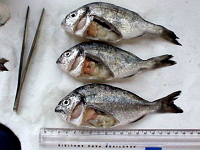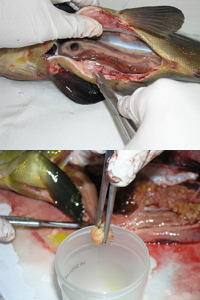DIAGNOSIS AND CONTROL OF PATHOLOGICAL PROCESSES IN SEAWATER AND CONTINENTAL WATER FISH
|
Description |

Specimens ready for study in the laboratory.
The Laboratory of Fish Diseases of the Complutense University of Madrid offers a diagnosis of infectious and parasitic diseases of fish, both wild and cultured, as well as advice on the control and prevention of these diseases.
We can also carry out studies on the immune response of fish to various stimuli, being able to assess both the immune response to different agents as the response to vaccination in a population and the level of stress.
|
How does it work |

Sampling for analysis.
Diseases are one of the most important limiting factors in fish production. Diagnosis, control and prevention of these diseases is essential to increase the benefits of the company, as they increase the number of animals that reach the market size, reduce the time necessary to reach this size, and reduce losses due to mortality and treatments. The research group has had enough experience of more than 20 years working in the field of fish diseases and is prepared to carry out the isolation and, above all, the identification of the different bacterial and viral agents that can affect these animals. In this sense, we have the usual technology for culture and bacterial identification, as well as with different cell lines of fish and the technology necessary to work with them. Likewise, we can carry out the identification of the most common parasites by direct observation under the microscope. All of which allows us to make a diagnosis of the transmissible pathological processes that affect the fish, and recommend the appropriate guidelines and measures for their control and prevention. The isolation of the different infectious agents also allows us to carry out both studies related to their virulence, as well as molecular determinations of these agents. On the other hand, the research group also has experience in studying the immune response to assess both the response to different pathogens as the response to vaccination or the level of stress to which the fish are subjected. In this sense, we can evaluate both the production of specific antibodies (specific immunity), as well as the activity of macrophages and the production of type I interferon (innate immunity).
|
Advantages |
Molecular determinations allow faster identification of those agents for which these methods have been developed. But they also allow the performance of studies of antigenic determinants, virulence, on immune response, etc. On the other hand, the study of the immune response allows to know certain aspects of the infections, the type and degree of response to them, as well as the response obtained after the vaccination. But it also serves to determine the level of stress of the animals after certain changes (handling, diets, etc.). This stress determination can be used to determine susceptibility to disease (higher stress levels translate into increased disease susceptibility).
|
Where has it been developed |
The Fish Diseases Laboratory of the Department of Animal Health of the Complutense University of Madrid is part of the COVEMI Group (Veterinary Control of Microorganisms) composed of researchers from the Department of Animal Health of the Faculty of Veterinary Medicine.
|
And also |
We are looking for companies dedicated to the cultivation, maintenance and production of fish of both culture and exhibition interested in applying the techniques offered by the research group.
|
Contact |
|
© Office for the Transfer of Research Results – UCM |
|
Descargas PDF |
|
Classification |
|
Responsible Researcher |
José Antonio García Cabrera: gcabrera@ucm.es
Department: Animal Health
Faculty: Veterinary Medicine


